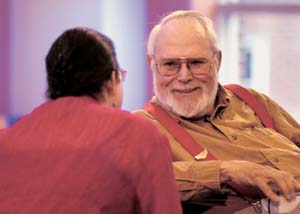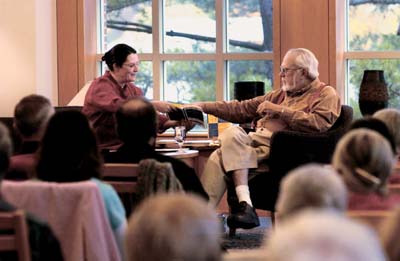 |
 |
| current issue |  |
past issues |  |
send a letter/news |  |
address update |  |
advertise |  |
about us |  |
alumni home |
Campus Currents
Do Pay Attention to That Man Behind the CurtainBy Virginia Stuart '75, '80G

|
During the quarter century Donald Murray '48 spent as a professor of journalism at UNH, he often spoke about the "terror" of facing a blank page. This confession seemed paradoxical to his students and colleagues. We knew Murray as a man of great stature both physically and professionally—a Pulitzer Prize winner, a World War II paratrooper. He seemed to have conquered fear both on and off the battlefield. Yet his acknowledgement showed us that we, too, could write—and teach writing.
In October, in a high-ceilinged reading room in the Dimond Library, Murray was the first subject of New Hampshire Public Television's "New Hampshire Authors' Series" hosted by Rebecca Rule '76, '79G, a writer and humorist who, Murray recalled, was once a shy freshman in his class. Murray, now a professor emeritus of English, still writes books and poems, as well as an award-winning column for the Boston Globe, "Now and Then."
For Murray, fear of the blank page seems to have lessened over time. "If you're flipping pancakes for 30 years," he told Rule, "you ought to be able to flip a pancake!" But other fears have come to pass. Minnie Mae, his wife of 53 years, had entered a nursing home, he noted. (She passed away in February.) "There is only one correspondent truly covering the terror-filled front of old age, Donald M. Murray, a poet in prose," wrote Max Frankel in The New York Times Magazine in 1998.
 "The New Hampshire Authors' Series" in October featured Rebecca Rule '76, '79G, left, interviewing Donald Murray '48. In January, UNH associate professor and novelist Charlotte Bacon appeared; in May, poet Donald Hall will be the guest. Past programs can be viewed at http://nhptv.org/outlook/ by searching the "Program Archives" link.
"The New Hampshire Authors' Series" in October featured Rebecca Rule '76, '79G, left, interviewing Donald Murray '48. In January, UNH associate professor and novelist Charlotte Bacon appeared; in May, poet Donald Hall will be the guest. Past programs can be viewed at http://nhptv.org/outlook/ by searching the "Program Archives" link.
|
Rule asked Murray to read aloud his column about the parallel between the imaginary world that had protected him from his difficult childhood and Minnie Mae's use of stories to bring order to her "blurred, strange world" of dementia. Like so much of his work these days, the essay reveals glimpses of beauty, truth and humanity framed by the losses that come with aging.
As Murray read, his hand quavered. A rising sense of tension filled the audience, which included many friends. Was Don, like Minnie Mae, suffering from Parkinson's disease?
"At one time in my life, I would have been embarrassed by the tremor my mother gave me," Murray announced a few moments later. The tension evaporated. "It's all right if you see my hand shaking. A lot of things don't matter when you're 80."
Once again, Murray had pulled back the curtain. He was both the Great Oz—the Pulitzer Prize-winning, paratrooping professor—and the sheepish fellow behind the curtain, someone just like the rest of us. He's not just showing us how to write, I realized. He's showing us how to live.
Virginia Stuart '75, '80G taught composition at UNH for eight years.
Easy to print version
blog comments powered by Disqus

